Strategic Commissioning Framework: NHS England Report Analysis
VerifiedAdded on 2020/01/28
|25
|6430
|173
Report
AI Summary
This report provides a comprehensive overview of strategic commissioning within the healthcare environment, focusing on NHS England's approach. It defines strategic commissioning, its key stages, and its importance in improving quality, efficiency, and patient outcomes. The report explores the strategic commissioning framework, including the IPC Commissioning Framework, and highlights NHS England's priorities and principles. It examines the role of Clinical Commissioning Groups (CCGs) and their contributions to reducing health inequalities. The report also discusses the NHS Five Year Forward View and the strategic commissioning framework for Warrington and Halton Hospitals (NHS Foundation Trust), analyzing the trust's background and its role in delivering healthcare services. The report emphasizes the importance of patient-centered care, coordinated care, and innovative approaches to meet changing patient expectations and complexities. The report also focuses on the primary care strategy and the strategic commissioning framework which aims to transform primary care in Warrington. The report offers valuable insights into the contemporary approaches to strategic commissioning, with a focus on the NHS context.
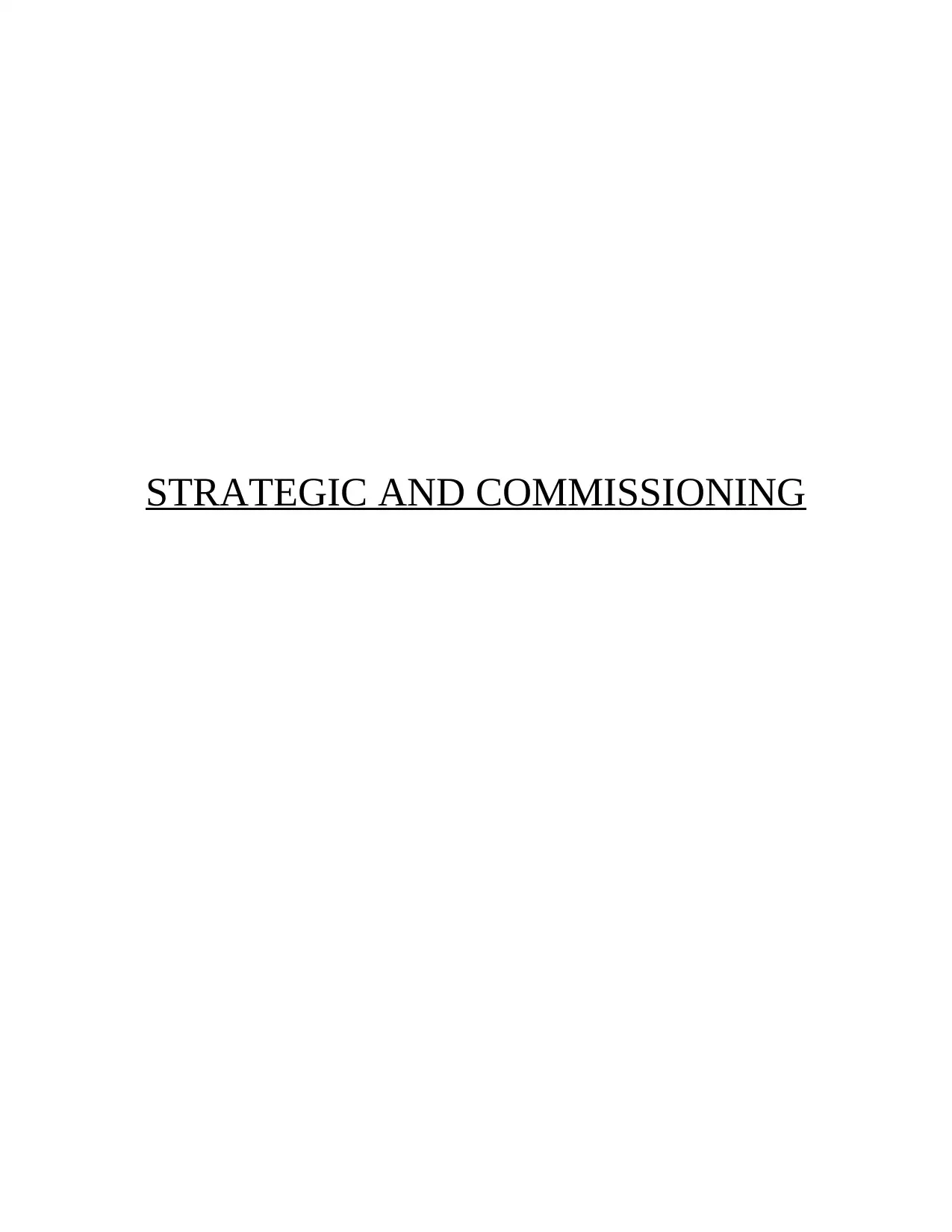
STRATEGIC AND COMMISSIONING
Paraphrase This Document
Need a fresh take? Get an instant paraphrase of this document with our AI Paraphraser
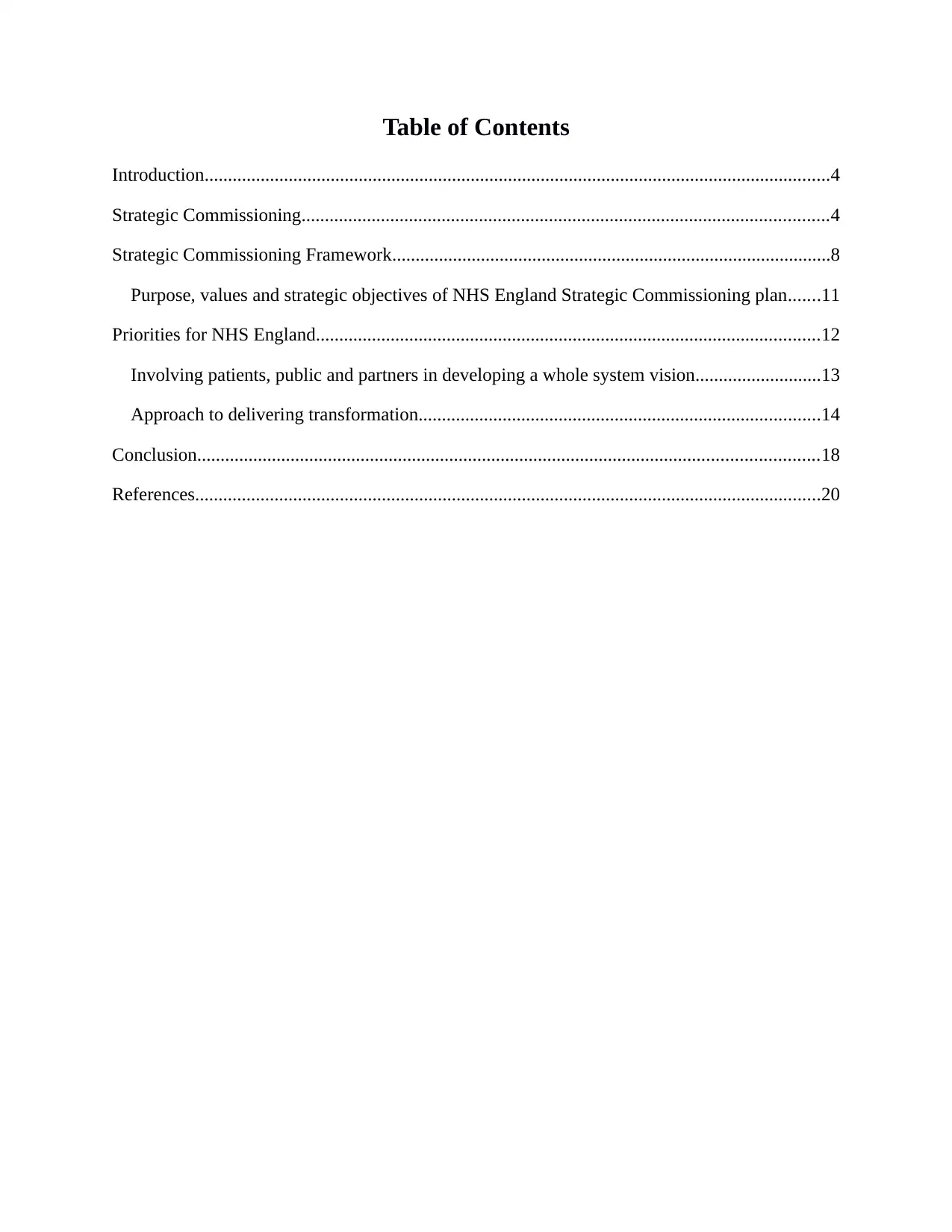
Table of Contents
Introduction......................................................................................................................................4
Strategic Commissioning.................................................................................................................4
Strategic Commissioning Framework..............................................................................................8
Purpose, values and strategic objectives of NHS England Strategic Commissioning plan.......11
Priorities for NHS England............................................................................................................12
Involving patients, public and partners in developing a whole system vision...........................13
Approach to delivering transformation......................................................................................14
Conclusion.....................................................................................................................................18
References......................................................................................................................................20
Introduction......................................................................................................................................4
Strategic Commissioning.................................................................................................................4
Strategic Commissioning Framework..............................................................................................8
Purpose, values and strategic objectives of NHS England Strategic Commissioning plan.......11
Priorities for NHS England............................................................................................................12
Involving patients, public and partners in developing a whole system vision...........................13
Approach to delivering transformation......................................................................................14
Conclusion.....................................................................................................................................18
References......................................................................................................................................20
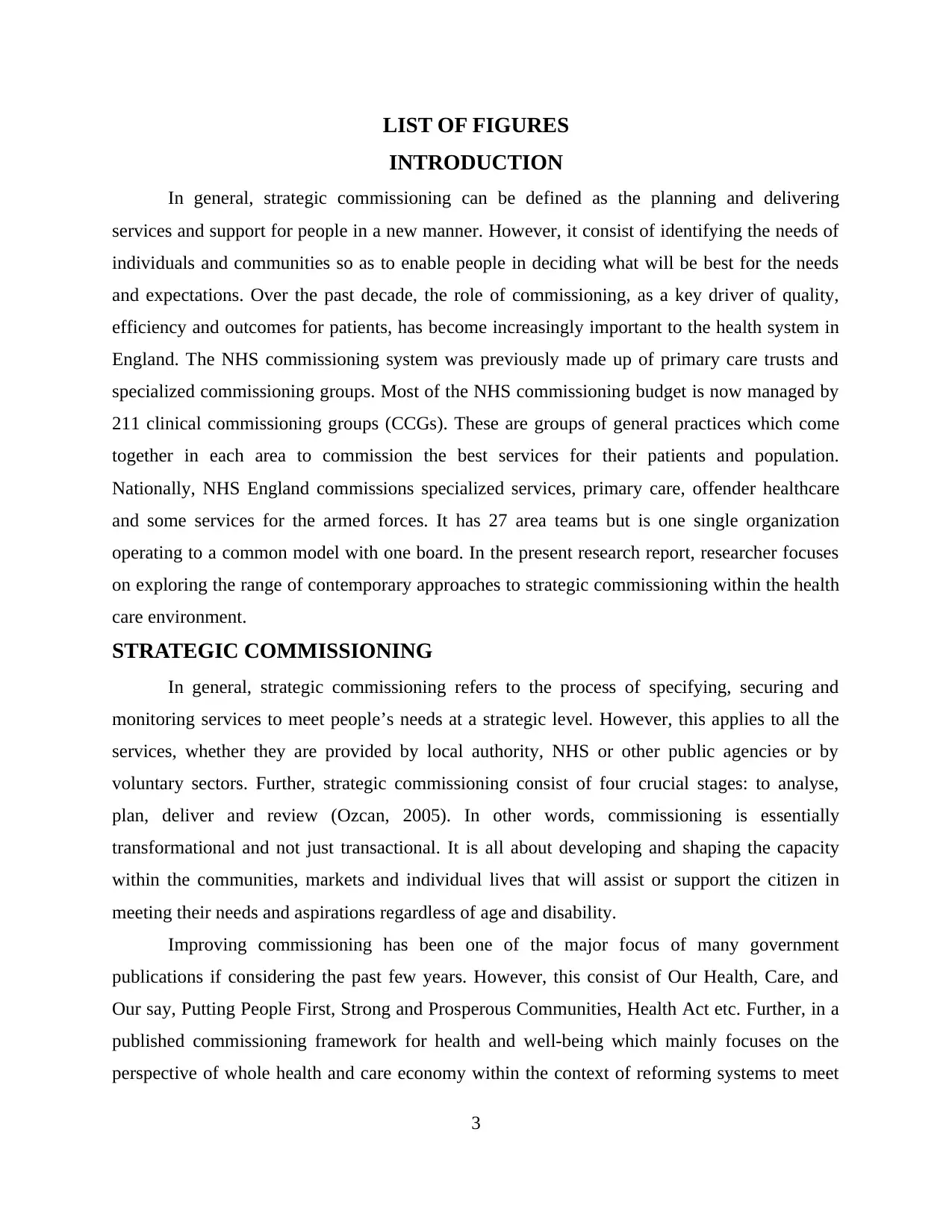
LIST OF FIGURES
INTRODUCTION
In general, strategic commissioning can be defined as the planning and delivering
services and support for people in a new manner. However, it consist of identifying the needs of
individuals and communities so as to enable people in deciding what will be best for the needs
and expectations. Over the past decade, the role of commissioning, as a key driver of quality,
efficiency and outcomes for patients, has become increasingly important to the health system in
England. The NHS commissioning system was previously made up of primary care trusts and
specialized commissioning groups. Most of the NHS commissioning budget is now managed by
211 clinical commissioning groups (CCGs). These are groups of general practices which come
together in each area to commission the best services for their patients and population.
Nationally, NHS England commissions specialized services, primary care, offender healthcare
and some services for the armed forces. It has 27 area teams but is one single organization
operating to a common model with one board. In the present research report, researcher focuses
on exploring the range of contemporary approaches to strategic commissioning within the health
care environment.
STRATEGIC COMMISSIONING
In general, strategic commissioning refers to the process of specifying, securing and
monitoring services to meet people’s needs at a strategic level. However, this applies to all the
services, whether they are provided by local authority, NHS or other public agencies or by
voluntary sectors. Further, strategic commissioning consist of four crucial stages: to analyse,
plan, deliver and review (Ozcan, 2005). In other words, commissioning is essentially
transformational and not just transactional. It is all about developing and shaping the capacity
within the communities, markets and individual lives that will assist or support the citizen in
meeting their needs and aspirations regardless of age and disability.
Improving commissioning has been one of the major focus of many government
publications if considering the past few years. However, this consist of Our Health, Care, and
Our say, Putting People First, Strong and Prosperous Communities, Health Act etc. Further, in a
published commissioning framework for health and well-being which mainly focuses on the
perspective of whole health and care economy within the context of reforming systems to meet
3
INTRODUCTION
In general, strategic commissioning can be defined as the planning and delivering
services and support for people in a new manner. However, it consist of identifying the needs of
individuals and communities so as to enable people in deciding what will be best for the needs
and expectations. Over the past decade, the role of commissioning, as a key driver of quality,
efficiency and outcomes for patients, has become increasingly important to the health system in
England. The NHS commissioning system was previously made up of primary care trusts and
specialized commissioning groups. Most of the NHS commissioning budget is now managed by
211 clinical commissioning groups (CCGs). These are groups of general practices which come
together in each area to commission the best services for their patients and population.
Nationally, NHS England commissions specialized services, primary care, offender healthcare
and some services for the armed forces. It has 27 area teams but is one single organization
operating to a common model with one board. In the present research report, researcher focuses
on exploring the range of contemporary approaches to strategic commissioning within the health
care environment.
STRATEGIC COMMISSIONING
In general, strategic commissioning refers to the process of specifying, securing and
monitoring services to meet people’s needs at a strategic level. However, this applies to all the
services, whether they are provided by local authority, NHS or other public agencies or by
voluntary sectors. Further, strategic commissioning consist of four crucial stages: to analyse,
plan, deliver and review (Ozcan, 2005). In other words, commissioning is essentially
transformational and not just transactional. It is all about developing and shaping the capacity
within the communities, markets and individual lives that will assist or support the citizen in
meeting their needs and aspirations regardless of age and disability.
Improving commissioning has been one of the major focus of many government
publications if considering the past few years. However, this consist of Our Health, Care, and
Our say, Putting People First, Strong and Prosperous Communities, Health Act etc. Further, in a
published commissioning framework for health and well-being which mainly focuses on the
perspective of whole health and care economy within the context of reforming systems to meet
3
⊘ This is a preview!⊘
Do you want full access?
Subscribe today to unlock all pages.

Trusted by 1+ million students worldwide
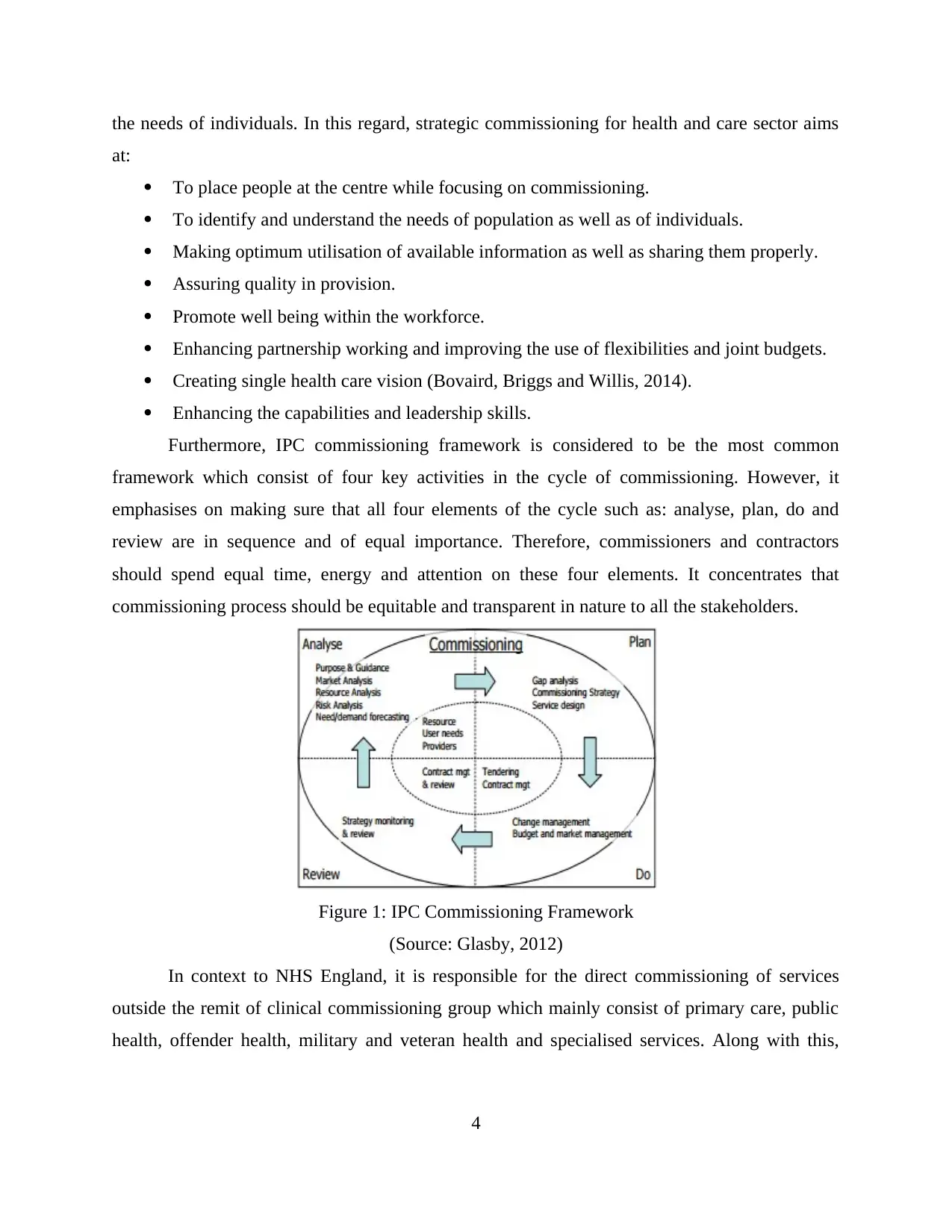
the needs of individuals. In this regard, strategic commissioning for health and care sector aims
at:
To place people at the centre while focusing on commissioning.
To identify and understand the needs of population as well as of individuals.
Making optimum utilisation of available information as well as sharing them properly.
Assuring quality in provision.
Promote well being within the workforce.
Enhancing partnership working and improving the use of flexibilities and joint budgets.
Creating single health care vision (Bovaird, Briggs and Willis, 2014).
Enhancing the capabilities and leadership skills.
Furthermore, IPC commissioning framework is considered to be the most common
framework which consist of four key activities in the cycle of commissioning. However, it
emphasises on making sure that all four elements of the cycle such as: analyse, plan, do and
review are in sequence and of equal importance. Therefore, commissioners and contractors
should spend equal time, energy and attention on these four elements. It concentrates that
commissioning process should be equitable and transparent in nature to all the stakeholders.
Figure 1: IPC Commissioning Framework
(Source: Glasby, 2012)
In context to NHS England, it is responsible for the direct commissioning of services
outside the remit of clinical commissioning group which mainly consist of primary care, public
health, offender health, military and veteran health and specialised services. Along with this,
4
at:
To place people at the centre while focusing on commissioning.
To identify and understand the needs of population as well as of individuals.
Making optimum utilisation of available information as well as sharing them properly.
Assuring quality in provision.
Promote well being within the workforce.
Enhancing partnership working and improving the use of flexibilities and joint budgets.
Creating single health care vision (Bovaird, Briggs and Willis, 2014).
Enhancing the capabilities and leadership skills.
Furthermore, IPC commissioning framework is considered to be the most common
framework which consist of four key activities in the cycle of commissioning. However, it
emphasises on making sure that all four elements of the cycle such as: analyse, plan, do and
review are in sequence and of equal importance. Therefore, commissioners and contractors
should spend equal time, energy and attention on these four elements. It concentrates that
commissioning process should be equitable and transparent in nature to all the stakeholders.
Figure 1: IPC Commissioning Framework
(Source: Glasby, 2012)
In context to NHS England, it is responsible for the direct commissioning of services
outside the remit of clinical commissioning group which mainly consist of primary care, public
health, offender health, military and veteran health and specialised services. Along with this,
4
Paraphrase This Document
Need a fresh take? Get an instant paraphrase of this document with our AI Paraphraser
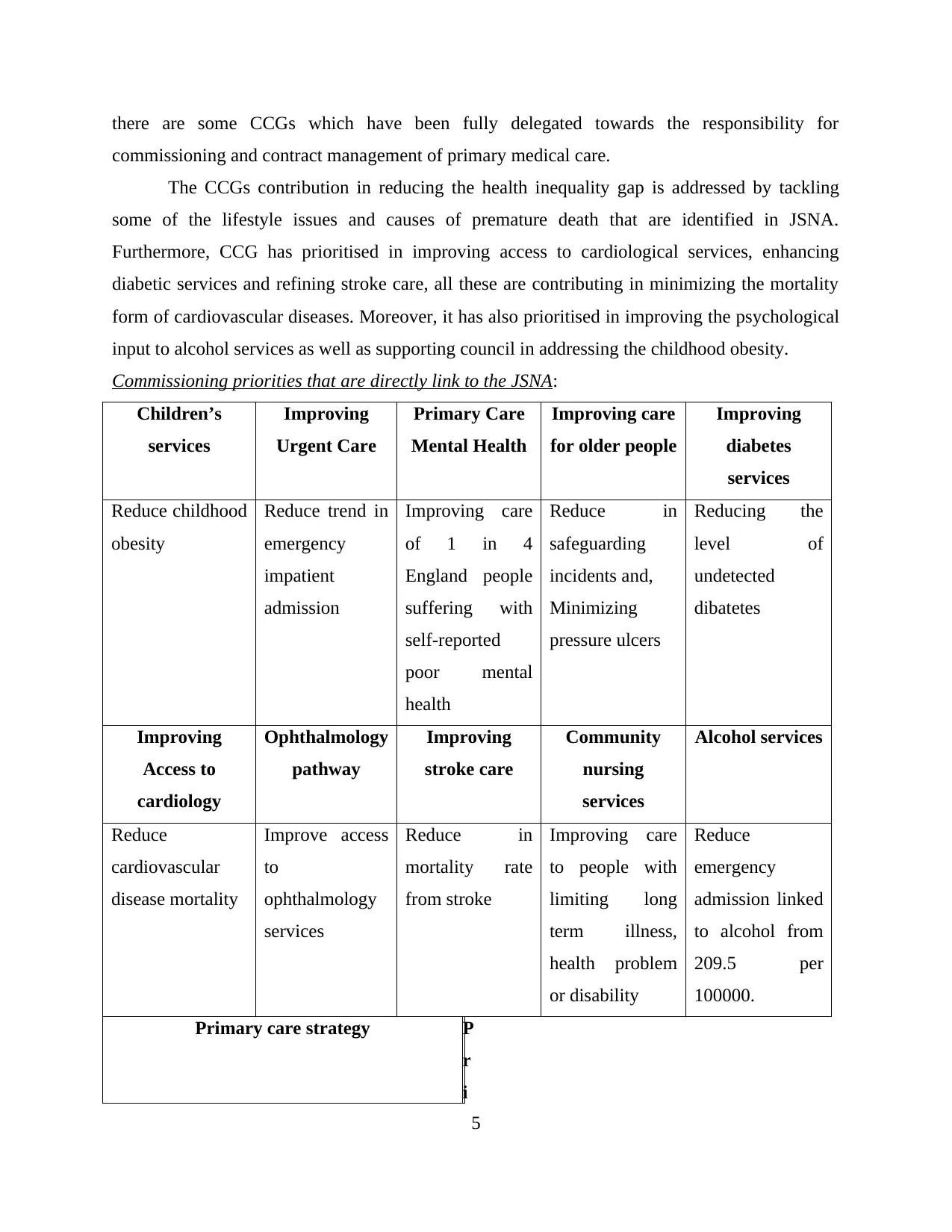
there are some CCGs which have been fully delegated towards the responsibility for
commissioning and contract management of primary medical care.
The CCGs contribution in reducing the health inequality gap is addressed by tackling
some of the lifestyle issues and causes of premature death that are identified in JSNA.
Furthermore, CCG has prioritised in improving access to cardiological services, enhancing
diabetic services and refining stroke care, all these are contributing in minimizing the mortality
form of cardiovascular diseases. Moreover, it has also prioritised in improving the psychological
input to alcohol services as well as supporting council in addressing the childhood obesity.
Commissioning priorities that are directly link to the JSNA:
Children’s
services
Improving
Urgent Care
Primary Care
Mental Health
Improving care
for older people
Improving
diabetes
services
Reduce childhood
obesity
Reduce trend in
emergency
impatient
admission
Improving care
of 1 in 4
England people
suffering with
self-reported
poor mental
health
Reduce in
safeguarding
incidents and,
Minimizing
pressure ulcers
Reducing the
level of
undetected
dibatetes
Improving
Access to
cardiology
Ophthalmology
pathway
Improving
stroke care
Community
nursing
services
Alcohol services
Reduce
cardiovascular
disease mortality
Improve access
to
ophthalmology
services
Reduce in
mortality rate
from stroke
Improving care
to people with
limiting long
term illness,
health problem
or disability
Reduce
emergency
admission linked
to alcohol from
209.5 per
100000.
Primary care strategy P
r
i
5
commissioning and contract management of primary medical care.
The CCGs contribution in reducing the health inequality gap is addressed by tackling
some of the lifestyle issues and causes of premature death that are identified in JSNA.
Furthermore, CCG has prioritised in improving access to cardiological services, enhancing
diabetic services and refining stroke care, all these are contributing in minimizing the mortality
form of cardiovascular diseases. Moreover, it has also prioritised in improving the psychological
input to alcohol services as well as supporting council in addressing the childhood obesity.
Commissioning priorities that are directly link to the JSNA:
Children’s
services
Improving
Urgent Care
Primary Care
Mental Health
Improving care
for older people
Improving
diabetes
services
Reduce childhood
obesity
Reduce trend in
emergency
impatient
admission
Improving care
of 1 in 4
England people
suffering with
self-reported
poor mental
health
Reduce in
safeguarding
incidents and,
Minimizing
pressure ulcers
Reducing the
level of
undetected
dibatetes
Improving
Access to
cardiology
Ophthalmology
pathway
Improving
stroke care
Community
nursing
services
Alcohol services
Reduce
cardiovascular
disease mortality
Improve access
to
ophthalmology
services
Reduce in
mortality rate
from stroke
Improving care
to people with
limiting long
term illness,
health problem
or disability
Reduce
emergency
admission linked
to alcohol from
209.5 per
100000.
Primary care strategy P
r
i
5
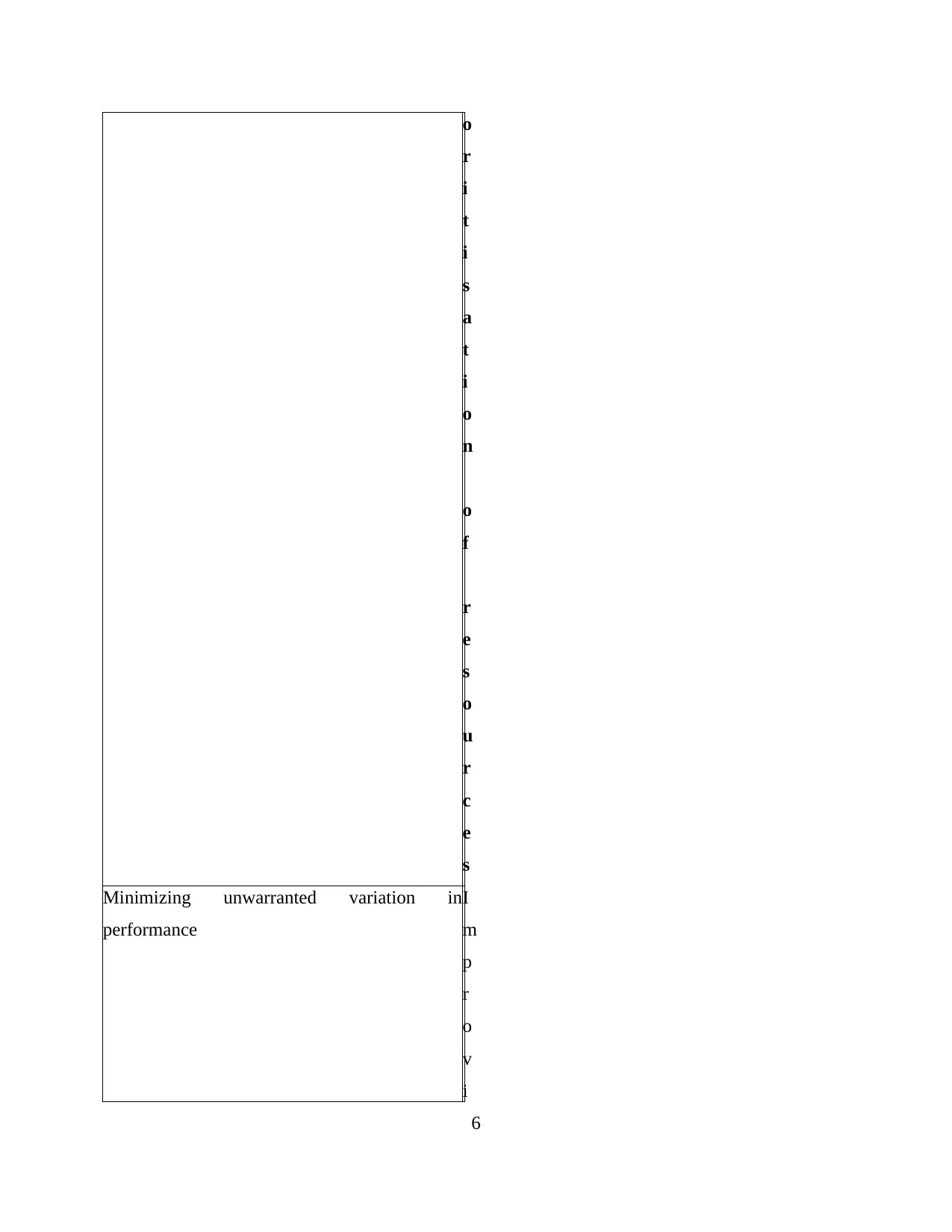
o
r
i
t
i
s
a
t
i
o
n
o
f
r
e
s
o
u
r
c
e
s
Minimizing unwarranted variation in
performance
I
m
p
r
o
v
i
6
r
i
t
i
s
a
t
i
o
n
o
f
r
e
s
o
u
r
c
e
s
Minimizing unwarranted variation in
performance
I
m
p
r
o
v
i
6
⊘ This is a preview!⊘
Do you want full access?
Subscribe today to unlock all pages.

Trusted by 1+ million students worldwide

n
g
p
r
o
d
u
c
t
i
v
i
t
y
t
o
a
c
h
i
e
v
e
f
i
n
a
7
g
p
r
o
d
u
c
t
i
v
i
t
y
t
o
a
c
h
i
e
v
e
f
i
n
a
7
Paraphrase This Document
Need a fresh take? Get an instant paraphrase of this document with our AI Paraphraser
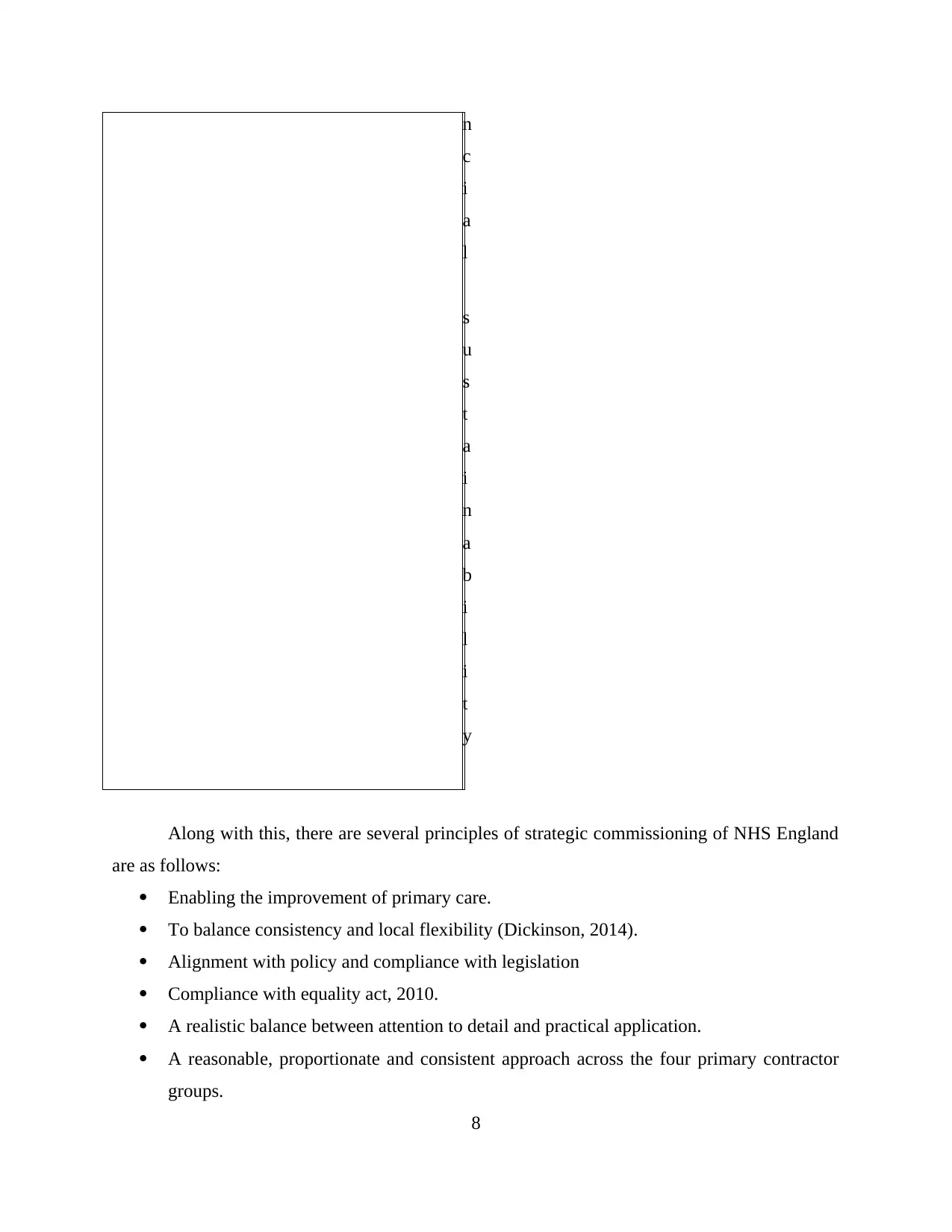
n
c
i
a
l
s
u
s
t
a
i
n
a
b
i
l
i
t
y
Along with this, there are several principles of strategic commissioning of NHS England
are as follows:
Enabling the improvement of primary care.
To balance consistency and local flexibility (Dickinson, 2014).
Alignment with policy and compliance with legislation
Compliance with equality act, 2010.
A realistic balance between attention to detail and practical application.
A reasonable, proportionate and consistent approach across the four primary contractor
groups.
8
c
i
a
l
s
u
s
t
a
i
n
a
b
i
l
i
t
y
Along with this, there are several principles of strategic commissioning of NHS England
are as follows:
Enabling the improvement of primary care.
To balance consistency and local flexibility (Dickinson, 2014).
Alignment with policy and compliance with legislation
Compliance with equality act, 2010.
A realistic balance between attention to detail and practical application.
A reasonable, proportionate and consistent approach across the four primary contractor
groups.
8
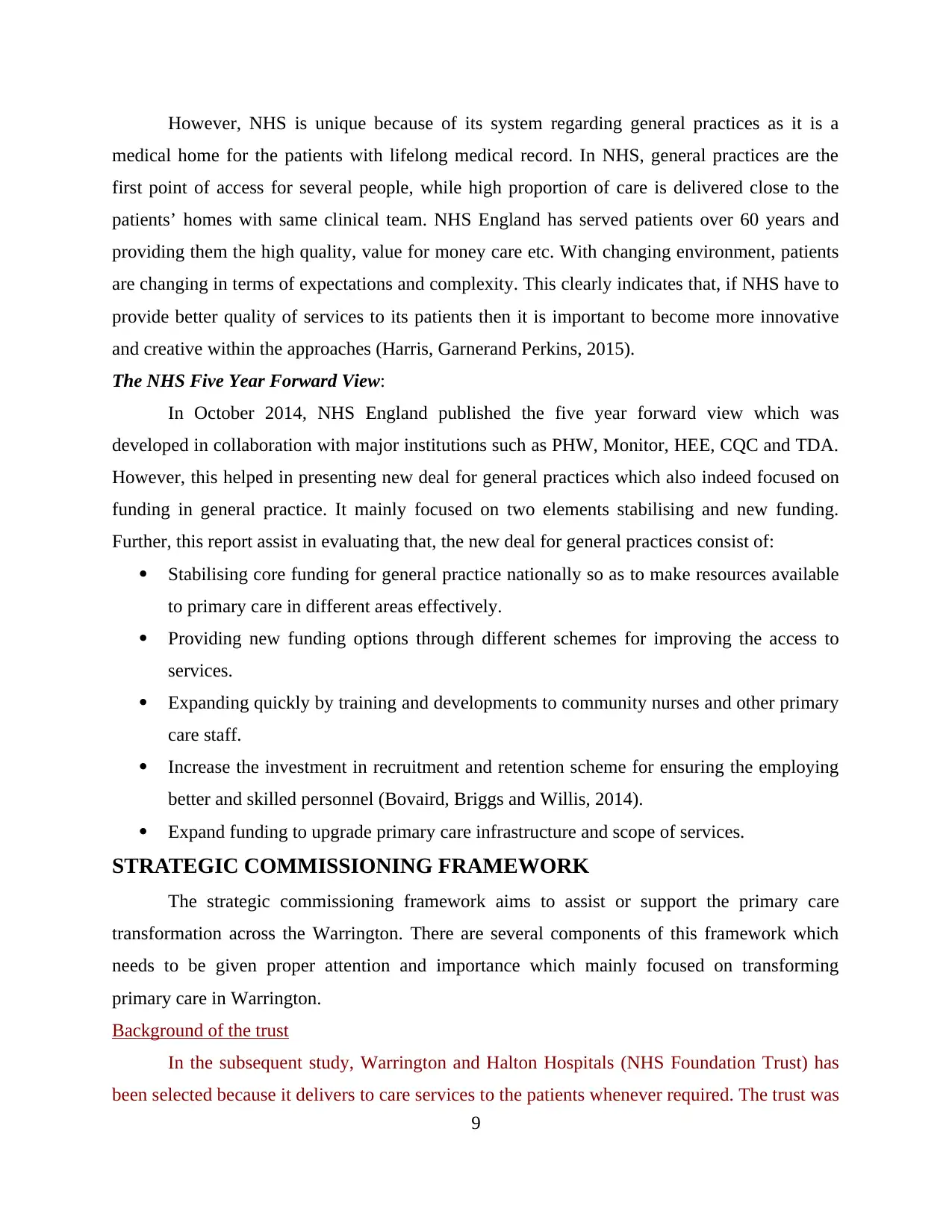
However, NHS is unique because of its system regarding general practices as it is a
medical home for the patients with lifelong medical record. In NHS, general practices are the
first point of access for several people, while high proportion of care is delivered close to the
patients’ homes with same clinical team. NHS England has served patients over 60 years and
providing them the high quality, value for money care etc. With changing environment, patients
are changing in terms of expectations and complexity. This clearly indicates that, if NHS have to
provide better quality of services to its patients then it is important to become more innovative
and creative within the approaches (Harris, Garnerand Perkins, 2015).
The NHS Five Year Forward View:
In October 2014, NHS England published the five year forward view which was
developed in collaboration with major institutions such as PHW, Monitor, HEE, CQC and TDA.
However, this helped in presenting new deal for general practices which also indeed focused on
funding in general practice. It mainly focused on two elements stabilising and new funding.
Further, this report assist in evaluating that, the new deal for general practices consist of:
Stabilising core funding for general practice nationally so as to make resources available
to primary care in different areas effectively.
Providing new funding options through different schemes for improving the access to
services.
Expanding quickly by training and developments to community nurses and other primary
care staff.
Increase the investment in recruitment and retention scheme for ensuring the employing
better and skilled personnel (Bovaird, Briggs and Willis, 2014).
Expand funding to upgrade primary care infrastructure and scope of services.
STRATEGIC COMMISSIONING FRAMEWORK
The strategic commissioning framework aims to assist or support the primary care
transformation across the Warrington. There are several components of this framework which
needs to be given proper attention and importance which mainly focused on transforming
primary care in Warrington.
Background of the trust
In the subsequent study, Warrington and Halton Hospitals (NHS Foundation Trust) has
been selected because it delivers to care services to the patients whenever required. The trust was
9
medical home for the patients with lifelong medical record. In NHS, general practices are the
first point of access for several people, while high proportion of care is delivered close to the
patients’ homes with same clinical team. NHS England has served patients over 60 years and
providing them the high quality, value for money care etc. With changing environment, patients
are changing in terms of expectations and complexity. This clearly indicates that, if NHS have to
provide better quality of services to its patients then it is important to become more innovative
and creative within the approaches (Harris, Garnerand Perkins, 2015).
The NHS Five Year Forward View:
In October 2014, NHS England published the five year forward view which was
developed in collaboration with major institutions such as PHW, Monitor, HEE, CQC and TDA.
However, this helped in presenting new deal for general practices which also indeed focused on
funding in general practice. It mainly focused on two elements stabilising and new funding.
Further, this report assist in evaluating that, the new deal for general practices consist of:
Stabilising core funding for general practice nationally so as to make resources available
to primary care in different areas effectively.
Providing new funding options through different schemes for improving the access to
services.
Expanding quickly by training and developments to community nurses and other primary
care staff.
Increase the investment in recruitment and retention scheme for ensuring the employing
better and skilled personnel (Bovaird, Briggs and Willis, 2014).
Expand funding to upgrade primary care infrastructure and scope of services.
STRATEGIC COMMISSIONING FRAMEWORK
The strategic commissioning framework aims to assist or support the primary care
transformation across the Warrington. There are several components of this framework which
needs to be given proper attention and importance which mainly focused on transforming
primary care in Warrington.
Background of the trust
In the subsequent study, Warrington and Halton Hospitals (NHS Foundation Trust) has
been selected because it delivers to care services to the patients whenever required. The trust was
9
⊘ This is a preview!⊘
Do you want full access?
Subscribe today to unlock all pages.

Trusted by 1+ million students worldwide
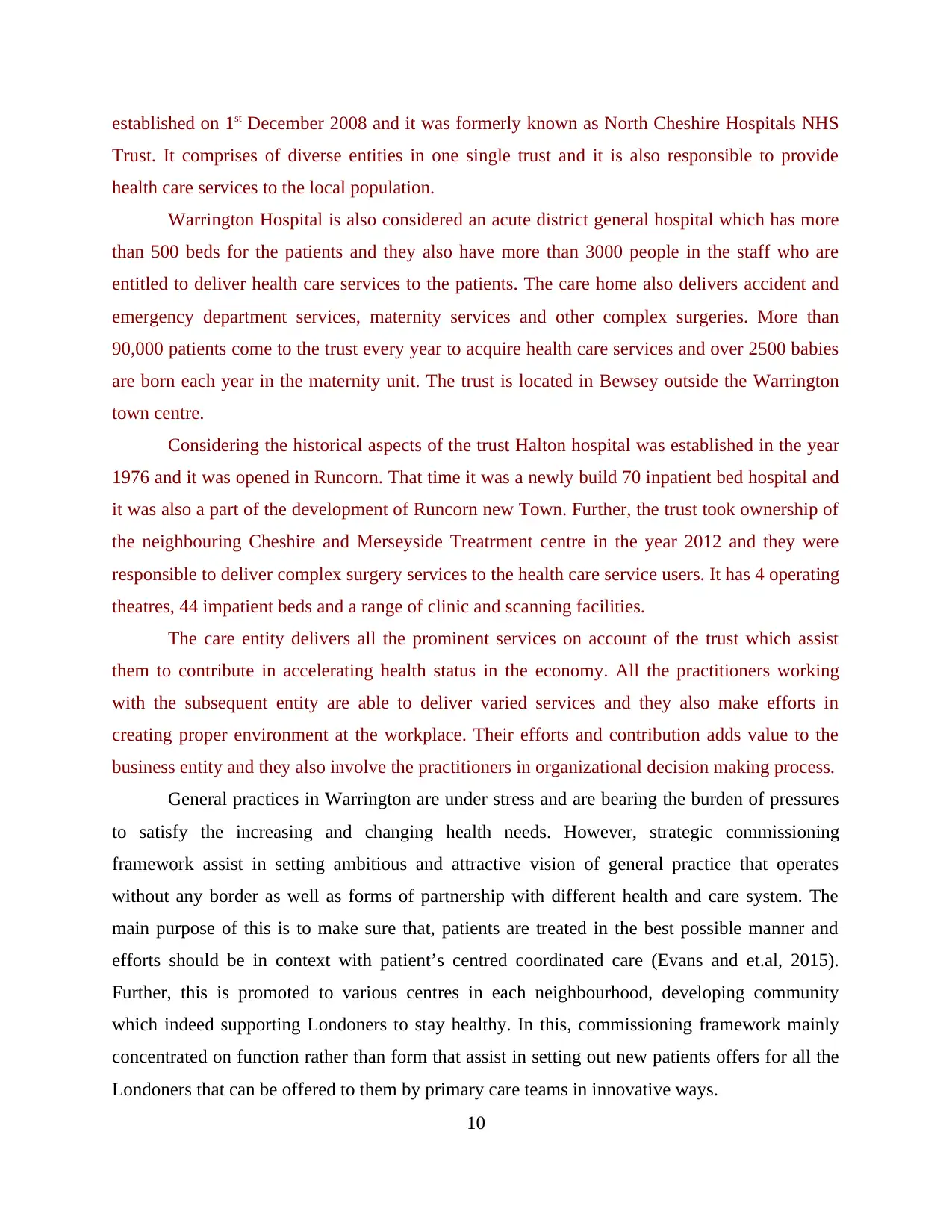
established on 1st December 2008 and it was formerly known as North Cheshire Hospitals NHS
Trust. It comprises of diverse entities in one single trust and it is also responsible to provide
health care services to the local population.
Warrington Hospital is also considered an acute district general hospital which has more
than 500 beds for the patients and they also have more than 3000 people in the staff who are
entitled to deliver health care services to the patients. The care home also delivers accident and
emergency department services, maternity services and other complex surgeries. More than
90,000 patients come to the trust every year to acquire health care services and over 2500 babies
are born each year in the maternity unit. The trust is located in Bewsey outside the Warrington
town centre.
Considering the historical aspects of the trust Halton hospital was established in the year
1976 and it was opened in Runcorn. That time it was a newly build 70 inpatient bed hospital and
it was also a part of the development of Runcorn new Town. Further, the trust took ownership of
the neighbouring Cheshire and Merseyside Treatrment centre in the year 2012 and they were
responsible to deliver complex surgery services to the health care service users. It has 4 operating
theatres, 44 impatient beds and a range of clinic and scanning facilities.
The care entity delivers all the prominent services on account of the trust which assist
them to contribute in accelerating health status in the economy. All the practitioners working
with the subsequent entity are able to deliver varied services and they also make efforts in
creating proper environment at the workplace. Their efforts and contribution adds value to the
business entity and they also involve the practitioners in organizational decision making process.
General practices in Warrington are under stress and are bearing the burden of pressures
to satisfy the increasing and changing health needs. However, strategic commissioning
framework assist in setting ambitious and attractive vision of general practice that operates
without any border as well as forms of partnership with different health and care system. The
main purpose of this is to make sure that, patients are treated in the best possible manner and
efforts should be in context with patient’s centred coordinated care (Evans and et.al, 2015).
Further, this is promoted to various centres in each neighbourhood, developing community
which indeed supporting Londoners to stay healthy. In this, commissioning framework mainly
concentrated on function rather than form that assist in setting out new patients offers for all the
Londoners that can be offered to them by primary care teams in innovative ways.
10
Trust. It comprises of diverse entities in one single trust and it is also responsible to provide
health care services to the local population.
Warrington Hospital is also considered an acute district general hospital which has more
than 500 beds for the patients and they also have more than 3000 people in the staff who are
entitled to deliver health care services to the patients. The care home also delivers accident and
emergency department services, maternity services and other complex surgeries. More than
90,000 patients come to the trust every year to acquire health care services and over 2500 babies
are born each year in the maternity unit. The trust is located in Bewsey outside the Warrington
town centre.
Considering the historical aspects of the trust Halton hospital was established in the year
1976 and it was opened in Runcorn. That time it was a newly build 70 inpatient bed hospital and
it was also a part of the development of Runcorn new Town. Further, the trust took ownership of
the neighbouring Cheshire and Merseyside Treatrment centre in the year 2012 and they were
responsible to deliver complex surgery services to the health care service users. It has 4 operating
theatres, 44 impatient beds and a range of clinic and scanning facilities.
The care entity delivers all the prominent services on account of the trust which assist
them to contribute in accelerating health status in the economy. All the practitioners working
with the subsequent entity are able to deliver varied services and they also make efforts in
creating proper environment at the workplace. Their efforts and contribution adds value to the
business entity and they also involve the practitioners in organizational decision making process.
General practices in Warrington are under stress and are bearing the burden of pressures
to satisfy the increasing and changing health needs. However, strategic commissioning
framework assist in setting ambitious and attractive vision of general practice that operates
without any border as well as forms of partnership with different health and care system. The
main purpose of this is to make sure that, patients are treated in the best possible manner and
efforts should be in context with patient’s centred coordinated care (Evans and et.al, 2015).
Further, this is promoted to various centres in each neighbourhood, developing community
which indeed supporting Londoners to stay healthy. In this, commissioning framework mainly
concentrated on function rather than form that assist in setting out new patients offers for all the
Londoners that can be offered to them by primary care teams in innovative ways.
10
Paraphrase This Document
Need a fresh take? Get an instant paraphrase of this document with our AI Paraphraser
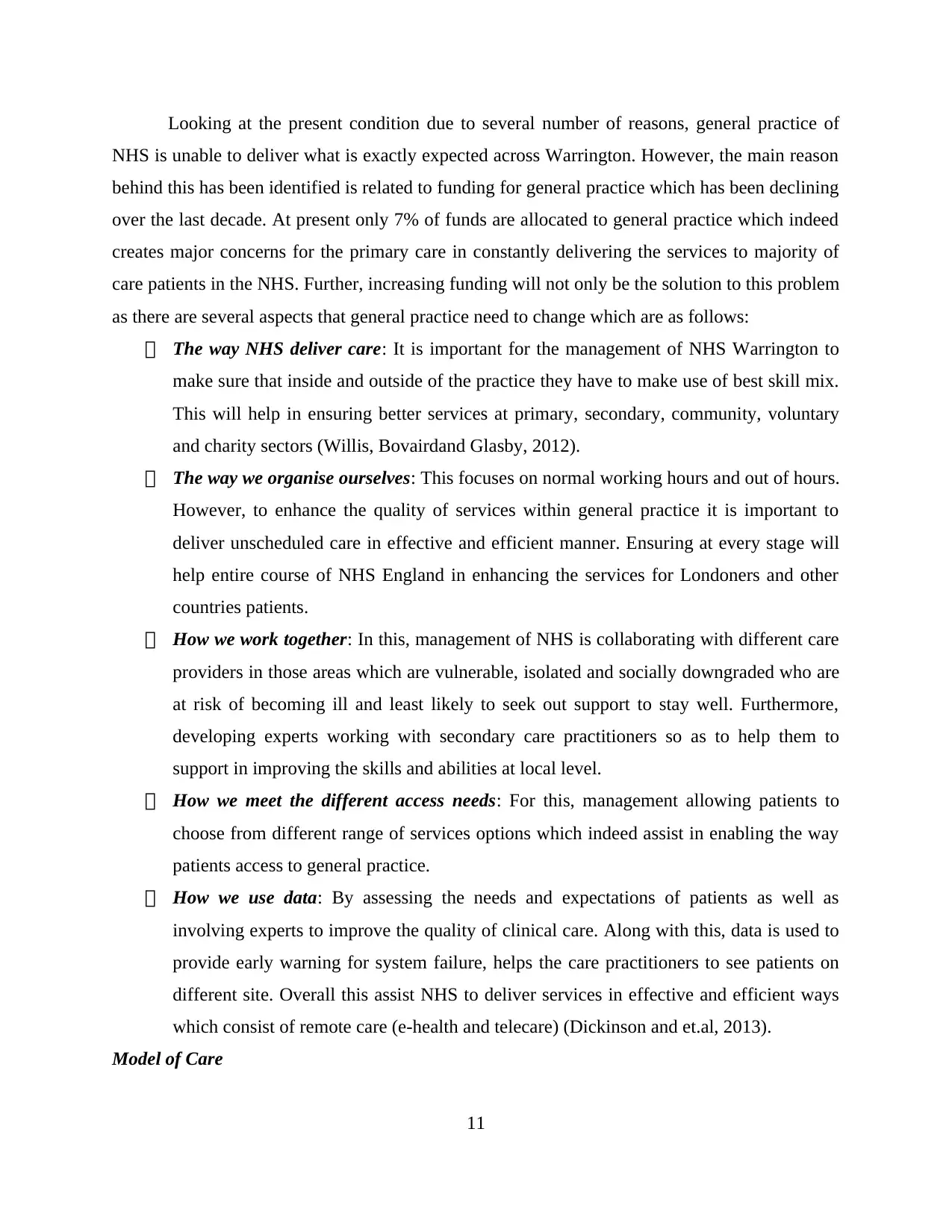
Looking at the present condition due to several number of reasons, general practice of
NHS is unable to deliver what is exactly expected across Warrington. However, the main reason
behind this has been identified is related to funding for general practice which has been declining
over the last decade. At present only 7% of funds are allocated to general practice which indeed
creates major concerns for the primary care in constantly delivering the services to majority of
care patients in the NHS. Further, increasing funding will not only be the solution to this problem
as there are several aspects that general practice need to change which are as follows:
The way NHS deliver care: It is important for the management of NHS Warrington to
make sure that inside and outside of the practice they have to make use of best skill mix.
This will help in ensuring better services at primary, secondary, community, voluntary
and charity sectors (Willis, Bovairdand Glasby, 2012).
The way we organise ourselves: This focuses on normal working hours and out of hours.
However, to enhance the quality of services within general practice it is important to
deliver unscheduled care in effective and efficient manner. Ensuring at every stage will
help entire course of NHS England in enhancing the services for Londoners and other
countries patients.
How we work together: In this, management of NHS is collaborating with different care
providers in those areas which are vulnerable, isolated and socially downgraded who are
at risk of becoming ill and least likely to seek out support to stay well. Furthermore,
developing experts working with secondary care practitioners so as to help them to
support in improving the skills and abilities at local level.
How we meet the different access needs: For this, management allowing patients to
choose from different range of services options which indeed assist in enabling the way
patients access to general practice.
How we use data: By assessing the needs and expectations of patients as well as
involving experts to improve the quality of clinical care. Along with this, data is used to
provide early warning for system failure, helps the care practitioners to see patients on
different site. Overall this assist NHS to deliver services in effective and efficient ways
which consist of remote care (e-health and telecare) (Dickinson and et.al, 2013).
Model of Care
11
NHS is unable to deliver what is exactly expected across Warrington. However, the main reason
behind this has been identified is related to funding for general practice which has been declining
over the last decade. At present only 7% of funds are allocated to general practice which indeed
creates major concerns for the primary care in constantly delivering the services to majority of
care patients in the NHS. Further, increasing funding will not only be the solution to this problem
as there are several aspects that general practice need to change which are as follows:
The way NHS deliver care: It is important for the management of NHS Warrington to
make sure that inside and outside of the practice they have to make use of best skill mix.
This will help in ensuring better services at primary, secondary, community, voluntary
and charity sectors (Willis, Bovairdand Glasby, 2012).
The way we organise ourselves: This focuses on normal working hours and out of hours.
However, to enhance the quality of services within general practice it is important to
deliver unscheduled care in effective and efficient manner. Ensuring at every stage will
help entire course of NHS England in enhancing the services for Londoners and other
countries patients.
How we work together: In this, management of NHS is collaborating with different care
providers in those areas which are vulnerable, isolated and socially downgraded who are
at risk of becoming ill and least likely to seek out support to stay well. Furthermore,
developing experts working with secondary care practitioners so as to help them to
support in improving the skills and abilities at local level.
How we meet the different access needs: For this, management allowing patients to
choose from different range of services options which indeed assist in enabling the way
patients access to general practice.
How we use data: By assessing the needs and expectations of patients as well as
involving experts to improve the quality of clinical care. Along with this, data is used to
provide early warning for system failure, helps the care practitioners to see patients on
different site. Overall this assist NHS to deliver services in effective and efficient ways
which consist of remote care (e-health and telecare) (Dickinson and et.al, 2013).
Model of Care
11
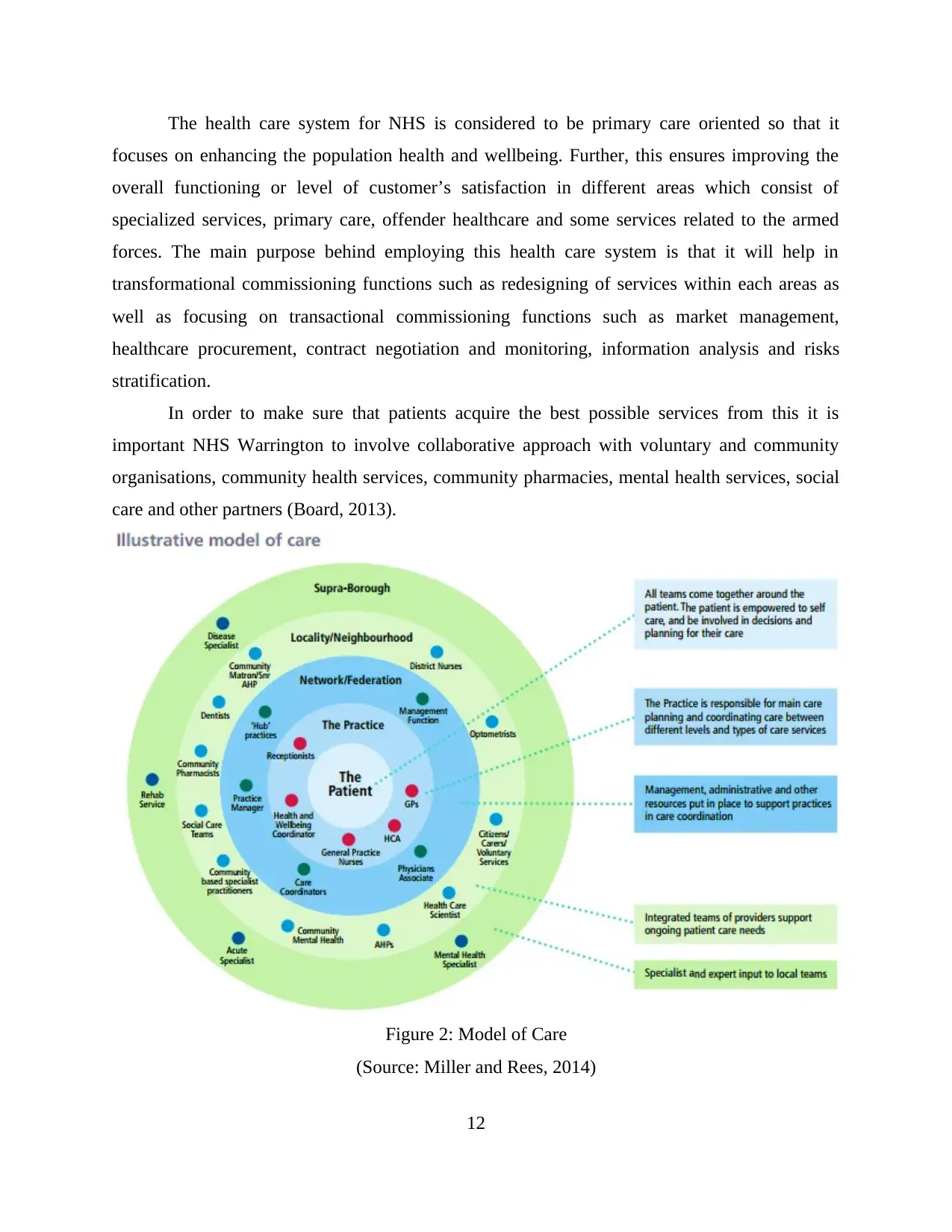
The health care system for NHS is considered to be primary care oriented so that it
focuses on enhancing the population health and wellbeing. Further, this ensures improving the
overall functioning or level of customer’s satisfaction in different areas which consist of
specialized services, primary care, offender healthcare and some services related to the armed
forces. The main purpose behind employing this health care system is that it will help in
transformational commissioning functions such as redesigning of services within each areas as
well as focusing on transactional commissioning functions such as market management,
healthcare procurement, contract negotiation and monitoring, information analysis and risks
stratification.
In order to make sure that patients acquire the best possible services from this it is
important NHS Warrington to involve collaborative approach with voluntary and community
organisations, community health services, community pharmacies, mental health services, social
care and other partners (Board, 2013).
Figure 2: Model of Care
(Source: Miller and Rees, 2014)
12
focuses on enhancing the population health and wellbeing. Further, this ensures improving the
overall functioning or level of customer’s satisfaction in different areas which consist of
specialized services, primary care, offender healthcare and some services related to the armed
forces. The main purpose behind employing this health care system is that it will help in
transformational commissioning functions such as redesigning of services within each areas as
well as focusing on transactional commissioning functions such as market management,
healthcare procurement, contract negotiation and monitoring, information analysis and risks
stratification.
In order to make sure that patients acquire the best possible services from this it is
important NHS Warrington to involve collaborative approach with voluntary and community
organisations, community health services, community pharmacies, mental health services, social
care and other partners (Board, 2013).
Figure 2: Model of Care
(Source: Miller and Rees, 2014)
12
⊘ This is a preview!⊘
Do you want full access?
Subscribe today to unlock all pages.

Trusted by 1+ million students worldwide
1 out of 25
Related Documents
Your All-in-One AI-Powered Toolkit for Academic Success.
+13062052269
info@desklib.com
Available 24*7 on WhatsApp / Email
![[object Object]](/_next/static/media/star-bottom.7253800d.svg)
Unlock your academic potential
Copyright © 2020–2026 A2Z Services. All Rights Reserved. Developed and managed by ZUCOL.





